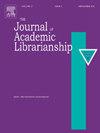Perspectives of librarians on the integration of metaverse into the future information services in higher education institutions
IF 2.5
3区 管理学
Q2 INFORMATION SCIENCE & LIBRARY SCIENCE
引用次数: 0
Abstract
This paper investigates librarians' perspectives on integrating metaverse technology into information services at higher education institutions in Ghana and Nigeria. The study employed a mixed-methods approach with a sequential explanatory design. Quantitative data were collected via Google Forms from sixty-eight (68) academic librarians and analysed using SPSS, while qualitative data were gathered from twelve (12) academic librarians through mobile phone interviews. The qualitative data gathered was analysed thematically. The study found that librarians possess limited knowledge of the metaverse, yet they view technology as a valuable resource for enhancing library services. Key challenges identified included insufficient infrastructure, resistance to change, security concerns, lack of technical expertise, and limited user awareness. The research recommends collaboration among stakeholders to address these obstacles in effectively integrating metaverse technologies into future library services. The study offers practical implications for library practice and policy in Africa.
高校图书馆馆员对未来高校信息服务整合元宇宙的看法
本文调查了加纳和尼日利亚高等教育机构图书馆员对将元宇宙技术整合到信息服务中的看法。本研究采用顺序解释设计的混合方法。定量数据通过谷歌表格从68位学术图书馆员中收集,并使用SPSS进行分析,定性数据通过手机访谈从12位学术图书馆员中收集。对收集到的定性数据进行了专题分析。研究发现,图书馆员对虚拟世界的了解有限,但他们认为技术是提高图书馆服务的宝贵资源。确定的主要挑战包括基础设施不足、对更改的抵制、安全问题、缺乏技术专长和有限的用户意识。该研究建议利益相关者之间进行合作,以解决这些障碍,有效地将元宇宙技术集成到未来的图书馆服务中。该研究为非洲的图书馆实践和政策提供了实际意义。
本文章由计算机程序翻译,如有差异,请以英文原文为准。
求助全文
约1分钟内获得全文
求助全文
来源期刊

Journal of Academic Librarianship
INFORMATION SCIENCE & LIBRARY SCIENCE-
CiteScore
5.30
自引率
15.40%
发文量
120
审稿时长
29 days
期刊介绍:
The Journal of Academic Librarianship, an international and refereed journal, publishes articles that focus on problems and issues germane to college and university libraries. JAL provides a forum for authors to present research findings and, where applicable, their practical applications and significance; analyze policies, practices, issues, and trends; speculate about the future of academic librarianship; present analytical bibliographic essays and philosophical treatises. JAL also brings to the attention of its readers information about hundreds of new and recently published books in library and information science, management, scholarly communication, and higher education. JAL, in addition, covers management and discipline-based software and information policy developments.
 求助内容:
求助内容: 应助结果提醒方式:
应助结果提醒方式:


